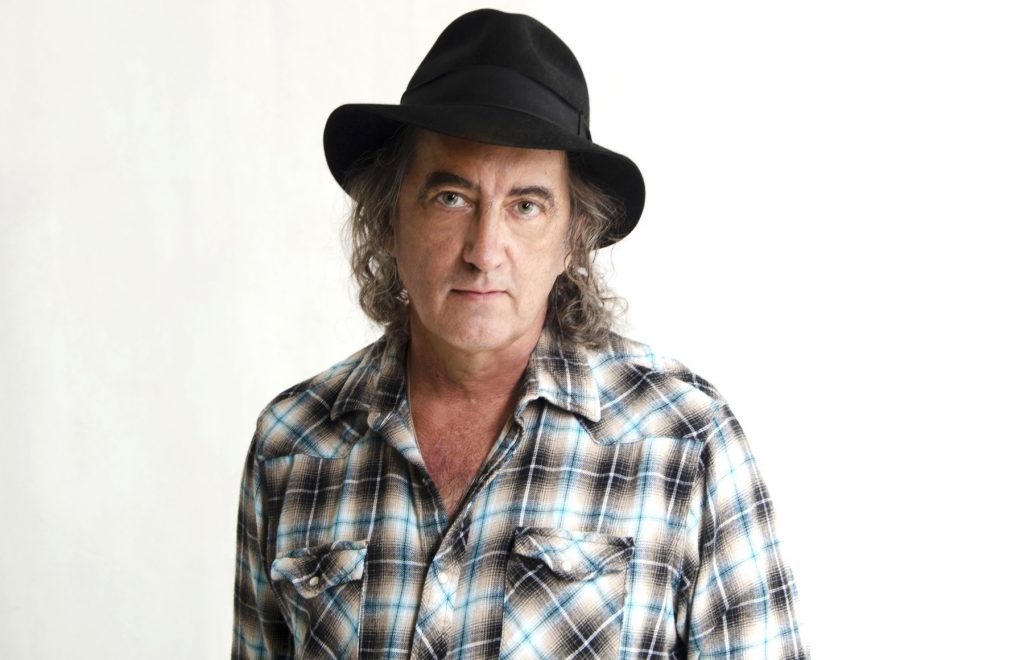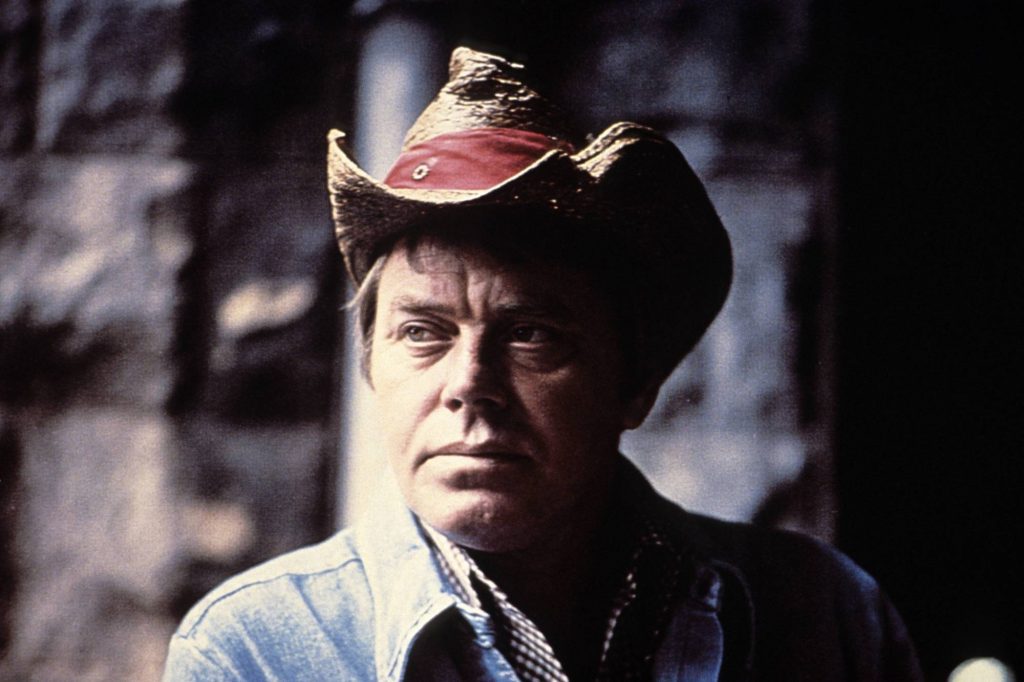
James McMurtry Is Hung Up on the Details
James McMurtry wants to make one thing clear: His songs are not about him. “Oh, no, there’s none of that,” the songwriter says, scoffing at the very notion. “I don’t do autobiography. My songs are made up.”
McMurtry is talking about The Horses and The Hounds, his stunning new record, and his first in six years, but he may as well be discussing his entire discography. For the past three-plus decades, the Texas singer has been writing songs that, even in the relatively writerly world of Americana, stand unparalleled for their richly cinematic detail, vivid sense of narrative and steadfast commitment to character-based storytelling. To call McMurtry’s music “literary” is not wrong, but the word more often than not is used as mere shorthand to draw connections between James and his father, the Texas literary giant Larry McMurtry, who died in March.
It’s more accurate to call McMurtry a formalist, a verse writer whose moving tales of downtrodden fishermen, lusty late middle-age loners, and stubborn “equestrian women,” as he calls them, originate not from any grand, novelistic sense of the human condition but, rather, the sounds of words and syllable counts and rhyme schemes. McMurtry is the type of songwriter who, in interviews, uses the word “meter” a lot. “I’m a fiction writer,” he says. “I just do it in verse, rather than prose, like my dad did.”
blogherads.adq.push(function () {
blogherads
.defineSlot( ‘medrec’, ‘gpt-dsk-tab-country-article-inbody1-uid0’ )
.setTargeting( ‘pos’, [“mid-article”,”mid”,”in-article1″,”btf”] )
.setSubAdUnitPath(“music//country//article//inbody1”)
.addSize([[300,250],[620,350],[2,2],[3,3],[2,4],[4,2]])
;
});
“Some artists, to be kind of blunt, will rhyme a ‘moon’ with ‘June’ and ‘spoon’ or a ‘love’ with ‘glove,’ ‘fight’ with ‘night,’ but with James, each word is very thought-out,” says Ross Hogarth, a longtime McMurtry collaborator and friend (he produced McMurtry’s latest) who’s worked with everyone from R.E.M. to Celine Dion. “There’s no word he puts in there as a throwaway.”
The Horses and The Hounds is the purest distillation yet of McMurtry’s artistic project, 10 story-songs set to a slightly more polished, Tom Petty-inspired, West Coast iteration of the rootsy, dusty palette McMurtry typically works in. There are too many jaw-dropping lyrical moments to count on the record, of which McMurtry is rather proud. “If anything, lyrically, it’s a little sharper, seems to me,” he says. “My rhyme and meter skills are intact, after all these years.”
Jackson Browne agrees with that sentiment — he lent McMurtry and Hogarth his Santa Monica Groove Masters studio for a series of recording sessions in 2019 and 2020. After the album was completed, Browne emailed Hogarth asking him when he could hear it. When Hogarth sent him the album, Browne responded within a few hours. “This James McMurtry album is really great,” Browne wrote to the producer. “It blew me away. He is so good. It’s really inspiring to hear someone with this command of the language.”
Such command is most evident on songs like “Jackie,” a haunting story with a gut-punch plot twist that came to McMurtry only after he grew attached to a particular phrase of words (“jack-knifed on black ice”) he had jotted down. McMurtry couldn’t resist the double rhyme, so much so that he ended up re-writing the entire arc of the song’s titular protagonist.
“I didn’t intend for Jackie to die,” McMurtry says. “I had written the [phrase] for what I thought was another song, and the trucker was male. At some point, I noticed that the early lines for ‘Jackie’ matched the rhyme and meter scheme of the trucker verse.”
blogherads.adq.push(function () {
blogherads
.defineSlot( ‘medrec’, ‘gpt-dsk-tab-country-article-inbody2-uid1’ )
.setTargeting( ‘pos’, [“mid-article”,”mid”,”in-article2″,”btf”] )
.setSubAdUnitPath(“music//country//article//inbody2”)
.addSize([[300,250],[300,251],[620,350],[2,4],[4,2]])
.setLazyLoadMultiplier(2)
;
});
Elsewhere, McMurtry fashions a troubled travelogue out of musical-sounding names of towns on the Florida Gulf coast (Apalachicola, Sopchoppy), spins a gorgeous tale of middle-aged loneliness based on his tour-bus observations of West Canadian agriculture (“Canola Fields”), and offers vividly rendered three-minute films inspired by short stories and novels by Wendell Berry and Robert Penn Warren (“Decent Man,” “Blackberry Winter”).
When it comes to his writing, McMurtry can be painstakingly thoughtful, going to great lengths to ensure every detail, syllable and writing credit is communicated effectively and equitably. After writing “Decent Man,” he sent a letter to Berry asking the Kentucky novelist if he’d like to share a writing credit on the song (Berry said it wasn’t necessary). He asked his friend and fellow Austinite Alejandro Escovedo to check over the lyrics he sings in Spanish on the heartbreaking ballad “Vaquero.” McMurtry is still caught up on a fictional fact-checking error in his 2008 masterpiece “Ruby & Carlos,” which includes a typically hyper-specific vernacular reference to a “Coggins test,” a common blood test to determine if horses have certain viruses.
“I thought that song was set in the Teton Valley of Idaho until an equestrian person told me we don’t test for Coggins up here,” says the songwriter. Since learning the news, McMurtry has mentally changed the song’s unspoken geographic setting to Southern Colorado. “They have all the same elements: potato fields, aspen trees, only it’s far enough South that they test for Coggins in horses.”
“James has his own vernacular, his own syntax, and his own perspective on life,” Hogarth says. “If you go hang out with James, you can see he’s just looking at what’s going on all the time. How does he have all this perspective? Well, because he’s listening, and he’s watching.”
Hogarth and John Mellencamp, who co-produced McMurtry’s 1989 debut Too Long in the Wasteland, used to have a teasing nickname for McMurtry at the beginning of the singer’s career: “Lonesome Lou Bob McReed.” It was their way of poking fun of McMurtry’s voice at the beginning of his career, a dusty, droll monotone, as if Lou Reed had emerged from the Hill Country. “It was two notes, three if you get lucky,” says Hogarth.
Nevertheless, in his first few records, McMurtry established himself as a first-rate songwriter, culminating in classics like “Rachel’s Song” and “Levelland” on his third album, 1995’s Where’d You Hide the Body. By the time he released 2002’s St. Mary of the Woods, several albums later, he had compiled a songbook that would be covered by everyone from Texas legends like Ray Wylie Hubbard and Robert Earl Keen to Americana stalwarts Kacey Chambers and Jason Isbell.
blogherads.adq.push(function () {
blogherads
.defineSlot( ‘medrec’, ‘gpt-dsk-tab-country-article-inbodyX-uid2’ )
.setTargeting( ‘pos’, [“mid-article”,”mid-articleX”,”mid”,”in-articleX”,”btf”] )
.setSubAdUnitPath(“music//country//article//inbodyX”)
.addSize([[300,250],[300,251],[3,3],[620,350]])
.setLazyLoadMultiplier(2)
;
});
Then, something strange happened. Right at the point in his career — six albums in, at age 40 — when the quality of so many singer-songwriters’ work begins to taper off, McMurtry began releasing the best songs of his life. The first was “Lights of Cheyenne,” a haunting seven-minute masterpiece he’d written years back told from the perspective of a despondent mother in an abusive relationship (“If you like heartbreaking songs,” Isbell once wrote, “find that one.”) McMurtry, ever the indifferent careerist, buried the song in the middle of a stopgap (but excellent) live record titled Live in Aught-Three.
From there, McMurtry continued to release the most accomplished work of his career on subsequent records like 2005’s Childish Things, 2008’s Just Us Kids, and his most recent album, 2015’s Complicated Game. But if there were a perceptible shift in the depth of songwriting halfway through his career, the McMurtry hardly sees it that way, flinching when presented with such a theory.
“I was never reaching for any particular type of storytelling,” he says. “I was always just trying to write enough songs for another record.”
It was a deliberate, drawn-out process between Complicated Game and The Horses and The Hounds. “I don’t want to be so blunt as to say he’s a procrastinator, but James will be the first one to tell you that he needs a deadline. Not to start, but to finish,” says Hogarth. “James writes when he wants to write. Some writers write like some people get up and go to the gym every day, because they feel like they need to keep the muscle intact. James writes when he’s inspired.”
McMurtry knew he wanted to reconnect with Hogarth, who’d worked on his first two albums and had remained a close friend ever since. The two had been talking for years about making a record together when Hogarth finally booked studio time at Groove Masters, forcing McMurtry to finish his long-brewing group of songs.
The first time McMurtry cut his vocals in Santa Monica in the summer of 2019, the smoke from nearby wildfires was so bad that he was unable to use hardly any of his vocal takes. Capturing perfect vocals was a huge emphasis for Hogarth on The Horses and The Hounds. Reflecting on the album, Hogarth marvels at how far Lonesome Lou Bob McReed has progressed as a singer in 30 years.
blogherads.adq.push(function () {
blogherads
.defineSlot( ‘medrec’, ‘gpt-dsk-tab-country-article-inbodyX-uid3’ )
.setTargeting( ‘pos’, [“mid-article”,”mid-articleX”,”mid”,”in-articleX”,”btf”] )
.setSubAdUnitPath(“music//country//article//inbodyX”)
.addSize([[300,250],[300,251],[3,3],[620,350]])
.setLazyLoadMultiplier(2)
;
});
“James is a much better singer than he’s ever been given credit for, or that he gives himself credit for,” says Hogarth, pointing to the huge range required to perform the album closer “Blackberry Winter.”
The LP’s release became stalled due to the pandemic, during which McMurtry resorted to weekly lo-fi livestream gigs from his living room. Like so many working musicians, McMurtry relies on touring as his primary source of income. He stayed afloat in 2020 by selling off boxes filled with old lyrics and early versions of songs to Texas State University, which will host the official James McMurtry archive alongside his father’s.
Ross Hogarth is discussing “Ft. Walton Wake-Up Call,” one of his personal favorites from The Horses and The Hounds. “Did James tell you anything about that one?”
Yes, and no. McMurtry is happy to talk about the surface level, mechanical process by which he comes up with his songs: In this case, a place-holder lyric for the chorus (“I keep losing my glasses”) ended up serving as an excuse to tell the story of a tragi-comic North Florida road trip.
But McMurtry is patently and respectfully uninterested in dissecting the emotional origins behind his work. “Basically, the story of [that] song,” explains Hogarth, “it’s a red herring for a pretty funky relationship.”
Hogarth talks about another change he’s seen in his old friend throughout his career. “He used to be strictly voyeuristic, but I think there’s a lot more of himself in some of these songs,” he says. “More than you’d think.”
Having heard McMurtry state the precise opposite, Hogarth’s assertion was striking. Is McMurtry saying that nothing in his music is autobiographical just another way of saying that everything in his music is autobiographical?
Hogarth points to the gut-punch refrain of “Canola Fields”: “Cashing in on a 30-year crush/You can’t be young and do that.” “He couldn’t have written that song in 1989, and if he had, nobody would’ve believed it,” says the producer. “Mastery is when you get to the place where you can say [that nothing in your music is autobiographical] honestly, because there’s so much of yourself in there that it’s just pure. Maybe it isn’t at all autobiographical, but the fact that you’ve lived this much life, seen this much, experienced that much, that’s what’s in there — your ability to take your experience and then tell the better story.”




